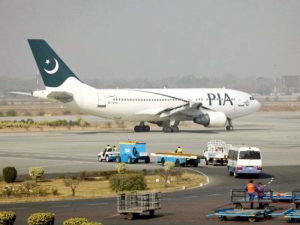We are experiencing a severe lack of available staff: PIA report
The Supreme Court is going to hear the national carrier’s appeal for hiring 250 more staff the following week.

ISLAMABAD: Pakistan International Airlines is experiencing a severe talent shortage in the fields of flight operations, services, information and technology, and finance as a result of the Supreme Court’s ban on new hiring since 2018.
The PIA submitted a report to the supreme court through its attorney Salman Akram Raja that stated, “Total separation in PIA since 2018 is 5,793 out of which 1,199 employees pertain to flight operations (pilots), flight services (cabin crew), finance, and IT department and no fresh hiring has been made while our immediate requirement is 250 employees for the year 2023.
Next week, a three-judge SC panel under the direction of Justice Ijazul Ahsan will consider the PIA petition asking for permission to hire 250 skilled personnel.
According to the research, the national carrier’s inability to hire new personnel due to the SC’s ban on hiring since 2018 caused the average age of its current workforce to rise to 45.2 years.
“According to the report, this has resulted to “a] shortage of operational crew and new hires with the most up-to-date corporate knowledge and contemporary skillset essential to elevate the national flag carrier to an era of advancement and innovative strategic commercial operations.”
Additionally, it is reported that the PIA and Turkish Airlines recently came to a code-sharing agreement.
According to the research, increasing flight frequency would be a crucial prerequisite for keeping operations functioning properly.
The PIA is forecasting an annual revenue of Rs205 billion for the year 2023 as a result of the code-share agreement with [the] Turkish Airlines, it continued.
The attainment of the predicted revenue depends on the introduction of new labour. Additionally, IATA [International Air Transport Association] has advised the PIA in its aim to upgrade its fleet and boost its human resources in proportion, depending on competency, the article stated.
Additionally, it is said that the PIA managed to expand its fleet by four A320 aircraft and one A320 Simulator in 2022 despite the lack of government funding.
It continued, “[A total of] 22 weekly flights to [the] UK and six weekly flights to [the] EU could not be added owing [to the suspension of] EASA [European Aviation Safety Agency]. Remote audit planned for March 7, 2023; depending on the results, operations to these destinations are likely to restart.
According to the research, domestic travel would increase from 3.2 million passengers in 2022 to 4.6 million in 2026 (PIA market share = 54%).
According to the forecast, international travel would increase from 10.7 million passengers in 2022 to 19.1 million in 2026 (PIA market share = 27%), with significant market expansion in Saudi Arabia, the United Arab Emirates, the United Kingdom, Canada, the United States, Australia, Afghanistan, Central Asian states, Malaysia, and Turkey.
“Additional pilots and cabin personnel will be needed to manage the expanded flight operations as a result of [an] increase in domestic and international passenger traffic, according to the report.
Regarding the number of pilots and first officers needed in the cockpit, the study noted that 100 more were still insufficient to meet the present standard, and the PIA was struggling to operate its aircraft, frequently asking the regulator to exempt the duty limitation requirement.
The study stated that “[this] leads in delays and flight schedule disruption whereby commercial interest and company’s brand is adversely damaged.”
“In addition, four more aircraft have been added simultaneously. The relationship between pilots and aircraft has changed, negatively affecting flight operations. As a result, 29 flights were cancelled in December due to a shortage of pilots, statistically speaking, resulting in significant financial loss and damage to the company’s reputation.
The PIA further argued before the court that, as a result of the development of flight operations in the post-Covid era, airlines were luring pilots away with high salaries, which the national carrier was unable to match.
The PIA pilots, who are already on the edge of separation, have already submitted 12 NOCs [no-objection certificates] for jobs and 12 applications for resignations/early retirement, according to the article.
“Due to retirement age superannuation, 13 additional separations were anticipated in 2023. Even if the restriction on hiring and recruiting cockpit staff is relaxed, the PIA would still need three to six months to train rated pilots, and more than nine to a year will be needed to prepare cadet pilots for their first flight.
In its report, the PIA stated that the hiring of 80 pilots was the absolute minimum necessary for the year 2023 and that the induction process needed to begin as soon as possible.
Around 109 pilots have reportedly been discharged from PIA service since the apex court’s enforcement of the restraint, according to the statement.
In its report, the national carrier stated that the International Civil Aviation Organization (ICAO) mandated that operators determine the minimal amount of cabin crew needed for each kind of aircraft in its fleet.
The purpose of this requirement, according to the statement, is to “enable a safe and prompt evacuation of the aircraft and to allow cabin crew to undertake the necessary responsibilities to be done in an emergency or a scenario necessitating emergency evacuation.”
According to the report, it was urgently necessary to hire competent and skilled staff in operational areas on a priority basis and the necessary strength in order to address the operational issues.










































